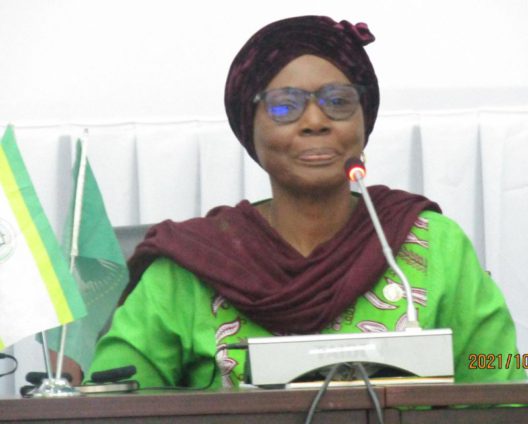The African Court on Human and People’s Rights says in strategic or public interest human rights litigation, the media are critical before, during, and after any successful justice process.
“Depending on how the stories are cast, presented, told and communicated, the media must, therefore, adopt innovative ideas on making human rights more attractive to the relevant stakeholders in the African context,” Lady Justice Imani D. Aboud, African Court President stated.
Lady Justice Aboud was speaking during a three-day African Court on Human and Peoples’ Rights Media Training for Senior Editors and Journalists in Dar es Salaam, Tanzania.
She said communication about the Court should be framed to meet the needs of its various stakeholders.
The African Court President noted that the training was also to empower the core senior editors and journalists to duly perform their mission in the chain of actions of the African Court.
“Whether for litigants to bring cases, for counsel to defend litigants, for academics or other knowledgeable institutions to act as amici curiae, for States to implement decisions or for regional organs to supervise the enforcement of the Court’s proceedings, the media plays a crucial role,” she said.
The African Court was established under Article 1 of the Protocol to the African Charter on Human and Peoples’ Rights.
The Protocol which was adopted by Member States of the then Organization of African Unity (OAU) in Ouagadougou, Burkina Faso, in June 1998 came into force on January 25, 2004.
African Court Media Network, therefore, questions the commitment of the African Union to the mandate of the African Court as currently only 31 AU Members States have ratified the Protocol to ensure the protection of human and peoples’ rights in Africa.
About 24 AU Member Countries have refused to ratify the African Court Protocol.

The countries which have ratified are Algeria, Benin, Burkina Faso, Burundi, Cameroon, Chad, Côte d’Ivoire, Comoros, Congo, Democratic Republic of Congo, Gabon, The Gambia, Ghana, Kenya, Libya, Lesotho, Mali, Malawi, Mozambique, Mauritania, Mauritius, Nigeria, Niger, Rwanda, Sahrawi Arab Democratic Republic, South Africa, Senegal, Tanzania, Togo, Tunisia, and Uganda.
However, only six out of the 31 State Parties to the Protocol had deposited the declaration, recognizing the competence of the African Court to receive cases directly from NGOs and individuals.
The six States are Burkina Faso, The Gambia, Ghana, Mali, Malawi, and Tunisia.
The African Court Media Network, therefore, challenged the AU member states to show commitment to the African Continental Court to protect the human rights of its people.
Latest Stories
-
CAFCC: Sports Minister to offer Dreams FC a ‘surprise’ package before Zamalek clash
7 mins -
CAF awards 3-0 win to RS Berkane, after Algerian customs confiscated their kits
21 mins -
AgriTech challenge pro holds first pitch
26 mins -
UNIDO commits to improving local rice standards
27 mins -
Suleja prison: 108 inmates on the run in Nigeria
30 mins -
We object to government’s plans to make BEST sole off-taker of Sentuo Oil Refinery – CBOD
38 mins -
Burkina Faso army massacred 223 villagers in revenge attack – HRW
47 mins -
Lebanese Community awards ¢100K in scholarships to 21 students at UniMAC
49 mins -
Germany detains alleged Nigerian mafia members
51 mins -
Manhyia Palace hosts royals, dignitaries from Ghana and beyond at special Awukudee
58 mins -
Meet the two Ghanaian entrepreneurs on a mission to connect 1 million African professionals to global companies by 2034
1 hour -
Celestine Donkor speaks on report of undergoing weight loss surgery
1 hour -
Music sensation Osb Swagah drops new single ‘Victory’
1 hour -
Bright Simons: The SML defence “falls flat”
1 hour -
We need long term macroeconomic stability to build a strong and vibrant economy – Deloitte Boss
1 hour

